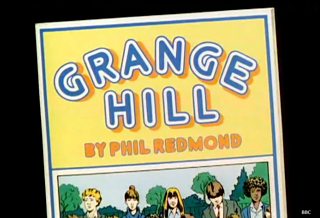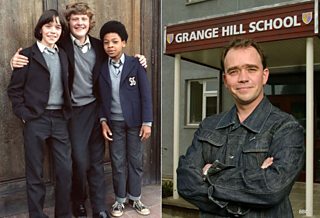
The original title sequence for Grange Hill was a pastiche of a children's comic, and memorably features the image of a sausage with a fork stuck in it: not a scene that made it into the actual show sadly
There’s nothing like an anniversary to make you feel old, and on 8 February 2018 it is 40 years since the first episode of Grange Hill was broadcast.
was the first realistic, long-running drama about school, told from the perspective of the children. It was set in a comprehensive school, and so was closer to the actual experiences of most of its audience: many previous school stories had been set in public schools or grammar schools, probably because most writers tended to have had that kind of education. Where other schools were featured they were rarely examined in detail, or were a backdrop to stories that were not fundamentally about the experience of going to school - and that was always what Grange Hill was interested in.
School fiction goes back at least to , written by Thomas Hughes in the 19th Century. Other writers also drew on their own school experiences, notably Charles Dickens, especially in , and . By the early 20th Century children’s comic papers brought new generations of school story writers. virtually invented the schoolgirl story (where hockey sticks were always jolly), and Enid Blyton and followed. Stories about boys' schools included a long run of adaptations in Children’s Hour of Anthony Buckeridge’s prep school hero , and Frank Richards’ was featured in a �������� television series of the 1950s and 1960s.
While many of these stories had children as their ostensible heroes, some dramas focused more on teachers. In the late 1950s �������� TV had (set in a Secondary Modern school), and , starring Wilfred Pickles as a village schoolmaster. In the mid 1960s examined life in a Scottish secondary school, while in the 70s there were plays like (and its spin-off series) and , a double bill Play for Today looking at aspects of education and how it failed some pupils.

Todd Carty played Tucker Jenkins (pictured, left, with Alan, played by George Armstrong, and Benny, played by Terry Sue-Patt) from the first episode of Grange Hill until 1982. After the spin-off Tucker's Luck he returned to the role in 2003 (pictured, right) and for the final episode in 2008
It was in this environment, reacting to the rise of comprehensive schools and flavoured by the cynicism of the mid-70s, that Grange Hill was born. Its creator and original writer Phil Redmond had previously written sitcom episodes and children’s drama, mainly for ITV. They turned down the idea for Grange Hill, but �������� executive producer Anna �������� was more receptive.
Grange Hill was a product of its times, and was a departure from the children’s drama previously on offer: , or ‘caper’ . Very little children’s drama tackled the daily realities of their lives – except educational fare such as the schools’ series , which could be safely shown to children with a teacher on hand. Grange Hill was shown in a slot when parents would be busy preparing meals or coming home from work, and some were concerned that it and bad language at a time of day when children were watching unsupervised, and didn't condemn it unequivocally.
Occasionally the bad behaviour teetered over into actual crime – shoplifting, vandalism and theft. Bullying was a topic which it would have been unrealistic to ignore, and was embodied in characters such as Michael Doyle, Jackie Heron and . As the early characters – Tucker, Alan and Benny, , Cathy Hargreaves, – were gradually replaced by successive generations of new pupils, more difficult topics were introduced. One of the most prominent stories was the heroin addiction of (Lee Macdonald), which tied in with the anti-drugs campaign. Another poignant plotline in the 80s concerned troubled Danny Kendall and his thorny relationship with teacher (Michael Sheard). In the early 90s there was the controversial depiction of the teenage pregnancy of .
For all the focus on Grange Hill’s pupils, as with Mr Bronson, there were also good roles for the actors playing teachers. Other memorable teachers included PE teacher (Michael Cronin) and long-serving head teacher (Gwynneth Powell).

Grange Hill in the 2000s had changed with the times: Emma (Daniella Fray), Tanya (Kirsten Cassidy) and Annie (Lauren Bunney) hone their IT skills, a phrase that wouldn't have meant much to Grange Hill pupils in 1978
In later years, Grange Hill was targeted at a younger age range, in line with �������� policy for its children’s programmes, when teenagers were no longer seen as part of the audience for children’s programmes. Some of the innovations were controversial, with occasional fantasy sequences, and a toning down of the drama to suit a younger target audience. The location of the show became less defined following the outsourcing of production to Phil Redmond’s own company, when recording switched to Liverpool.
Redmond had moved on to other projects after the first few years of Grange Hill, including the Channel 4 soap Brookside, and later Hollyoaks. He wanted to restore the original feel of Grange Hill, including bringing back the original title theme – a piece of library music called “Chicken Man”. But after a few series it was decided to call it a day, and, with a cameo appearance by original cast member Todd Carty (as Tucker Jenkins, who had also been spun off into his own series in the early 80s), the final episode of Grange Hill was transmitted on .
